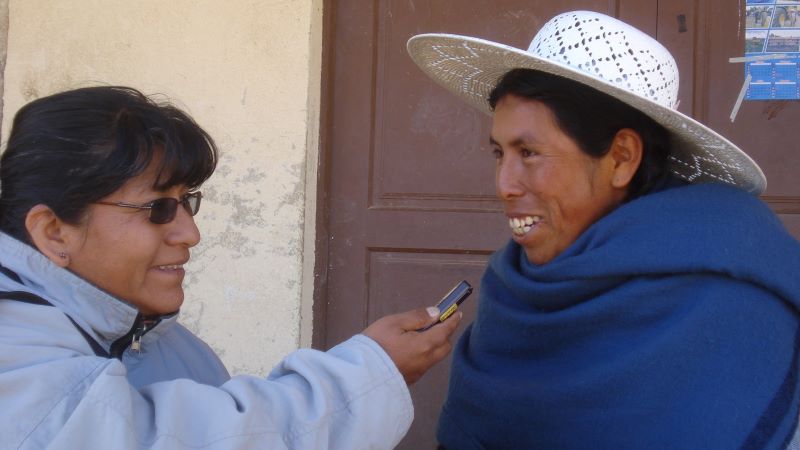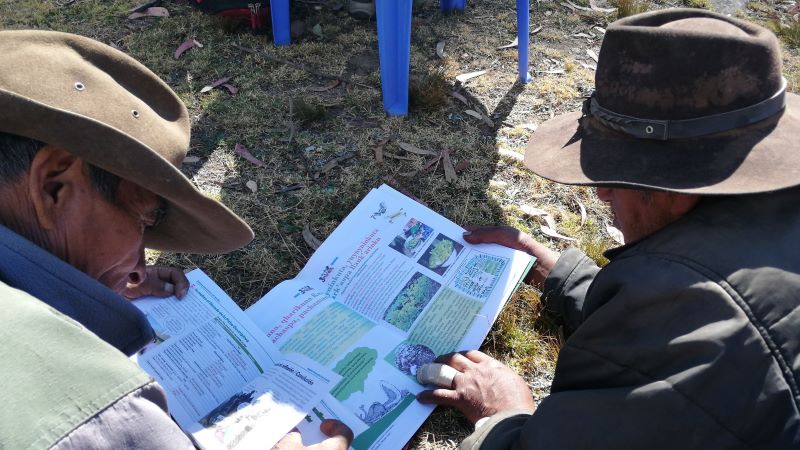A language of encounter

On Mother Language Day we celebrate cultural and linguistic diversity around the world. Lucy Jardine, Communications Officer, talked to our partner CENDA in Bolivia on the importance of preserving mother languages, and shares her thoughts on how learning languages enables deep encounters.
I find the concept of ‘mother language’ fascinating. Growing up in the Netherlands, and going to a Dutch school, learning multiple languages was practically a given. For a while I was studying six: English, Dutch, French, German, Latin and Ancient Greek. Since then, I’ve added a few more – Italian at university, a smattering of Indonesian, and, more recently, Spanish and Portuguese. I’ve been called all sorts of names, not all nice, but the most flattering of these was ‘poliglotta’. Multi-tongue… I’m OK with that!
One pastime I enjoy is comparing the way we say things in different languages – and how there are those untranslatable words and expressions that say so much about a culture. Why do we say that a car ‘runs’ in English, when it ‘walks’ in Italian? People tell me I seem different when I speak a particular language. I speak softly in Italian, they say, and am more direct in Dutch.
Languages are, however, more than a source of light entertainment.
Preserving native languages
The UN estimates that, every two weeks, a language is lost. Our partner CENDA in Bolivia, who works with Quechua and Aymara-speaking indigenous communities, has shared some of their and community members’ thoughts on the importance of mother languages. Noelia says: “When a language declines and eventually disappears, it is not only the language that is lost, but a whole culture and a whole people, with all of their customs and beliefs. By preserving a native language there is still the hope of being able to revitalise [the culture] and share all of its knowledge” – indigenous knowledge that is key for growing sustainable crops, protecting the environment and caring for our common home. For example, we know that, in indigenous territories in Bolivia where property rights have been secured, deforestation rates are 2.8 times lower than outside of them. Indigenous communities’ contribution to fighting climate change cannot be overstated.

CENDA produces two magazines in Quechua – one for children and one for adults. They’ve also created an App for teaching Quechua to children. Quechua is the mother tongue for many rural communities, but it is being lost. It can be seen as a hindrance to ‘advancement’, even though it is recognised as one of Bolivia’s 36 official languages. I’ve heard the same from communities in Peru, who are fighting to preserve their languages and culture.
This year, the theme for International Mother Language Day is multi-lingual education. The UN says that only a few hundred languages have genuinely been given a place in education systems and the public domain, and less than a hundred are used in the digital world. Palmira, a primary school teacher from Cochabamba in Bolivia, emphasises how important multi-lingual education is, saying: “It’s important that new generations practise their culture and their language and preserve it, so that their identity is not lost.”
We asked her what is different about Quechua. Is there anything that you can say in Quechua that you can’t say in Spanish? She told us that, mostly, words are translatable, but that Quechua allows you to express your feelings in a soft, gentle way.
Wendy, from Potosi, shared the Quechua word ‘munaririkullariwaypuni’ with us. It expresses, in a single word, someone’s desire to be loved.
Reaching people on a deeper level
Our CAFOD values, informed by Catholic Social Teaching, include solidarity, dignity, leaving no-one behind. How can we do that if we can’t communicate in the very essence of what makes people who they are? The pandemic highlighted this imperative to meet people where they are. CAFOD partners stepped in where governments have failed, providing crucial information in a culturally sensitive way to indigenous communities on how to keep themselves safe.
What is Catholic Social Teaching?
Lidia from CENDA told us how important it was for her to learn Aymara. Even though she doesn’t speak it very well, she told us how it helps her to communicate, especially with the women, who often don’t speak Spanish. And Julia added how important it has been for her to be able to speak Quechua in Quechua-speaking communities: “It generates confidence, it opens doors and when you start speaking Quechua with a family, they open up to you, without being embarrassed or fearful, because they know that you are part of them.”
For me, Julia’s observation is key. As I reflect on the opportunities I have had to learn different languages, I realise that they have enabled me to be truly present with the people I meet. They have helped me to have an encounter at a far deeper level than would otherwise have been possible.
It is crucial that we continue to support organisations such as CENDA, valuing native languages. In doing so, we are listening to the thoughts, ideas, challenges, struggles and joys of indigenous peoples – and their wisdom in combatting climate change.